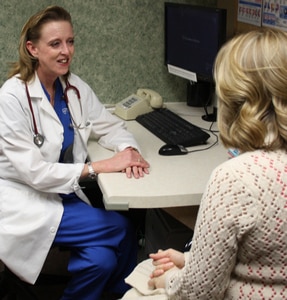Menopause is inevitable for any woman who lives long enough. It’s a natural part of aging.
While menopause can be a blessing for those with a history of heavy periods and pelvic pain, for most, it comes with hot flashes, mood swings, and a host of other undesirable symptoms. However, while it’s true that symptoms can be unpleasant and can last for many years, help is available. 
Dr. Kari Wessman, OB/GYN at RiverView Health, helps women experiencing the unwanted symptoms of menopause in her practice in Crookston and East Grand Forks. From lifestyle changes to a variety of therapies, she helps women get through the stages of menopause and move on to symptom-free years.
According to the American Congress of Obstetricians and Gynecologists, an estimated 6,000 U.S. women reach menopause every day (over 2 million per year), with the average age being 51.
Is it Menopause?
While you may suspect you’ve entered a stage of menopause if you haven’t had a menstrual cycle in many months and you’re dealing with unpleasant symptoms, Dr. Wessman said it’s important to determine if those factors are due to menopause or something else like medications, other endocrine disorders, certain mood disorders, etc., before starting any treatment.
For women who do not have a functioning uterus, Dr. Wessman often has the patient take a blood test to check for elevated levels of follicle-stimulating hormone to suggest menopause or perimenopause. If the patient is menopausal, Dr. Wessman and the patient discuss the risks, benefits, and alternatives of different treatments so they can agree on a treatment plan, if needed.
There are many ways to manage menopausal symptoms, including making healthier choices, non-hormonal medications, or hormone replacement therapy, Dr. Wessman reported.
The Stages of Menopause
Menopause happens gradually and is defined by three stages:
- Perimenopause: This is the transition stage leading up to menopause. During this time, a woman’s ovaries gradually produce less estrogen. Decreased estrogen leads to bone loss, higher risk of heart attacks and stroke, frequent urination, and can leave a woman susceptible to increased vaginal and urinary infections. Most women are in their 40s when perimenopause starts, with it lasting about 3-4 years. In the final one to two years of perimenopause, the drop in estrogen accelerates and many women experience hot flashes, mood swings, and a variety of other bothersome symptoms. Perimenopause ends when ovaries stop releasing eggs, at which time menopause begins.
- Menopause: When you’ve gone without a menstrual period for 12 months, you’ve reached menopause. Most women enter menopause between the ages of 45-55. This marks the end of a woman’s reproductive years. The ovaries no longer release eggs and hormones. Symptoms vary for each woman, but many experience hot flashes, night sweats and/or cold flashes, vaginal dryness, urinary urgency, insomnia, emotional changes, breast tenderness, and more.
- Postmenopause: The good news – During this stage, menopausal symptoms may get better. The not-so-good news – Because of a lower estrogen level, people in the postmenopausal phase are at an increased risk for several health conditions, such as osteoporosis and heart disease.
Dealing with Symptoms
“Hot flashes, night sweats, mood lability, and vaginal dryness seem to be the most frequent concerns,’’ Dr. Wessman said of her patients’ menopausal symptoms. “Bladder frequency, osteoporosis, and libido also rank up there.’’
Lifestyle changes – limiting caffeinated beverages and alcohol, exercising, a well-balanced diet, maintaining a healthy weight, not smoking, and managing chronic health conditions, such as high cholesterol or high blood pressure – may bring relief from some symptoms.
Over-the-counter medications and non-hormonal prescriptions may also help. There are three major categories of non-hormonal medications used to manage the symptoms of menopause:
- SSRI antidepressants such as Paxil, Prozac, Zoloft, and Lexapro can help reduce symptoms like hot flashes and night sweats. If depression is one of the menopausal symptoms, these medications can also help with that.
- Blood pressure medications can help with vasomotor symptoms like hot flashes, rapid heartbeat, and sweating.
- Medications to treat and prevent osteoporosis can be used to strengthen bones and prevent bone loss.
If these routes don’t bring relief, many women turn to hormone replacement therapy (HRT),
Hormone Replacement Therapy
HRT is considered one of the most effective treatments for menopause management. This treatment aims to replace the estrogen and progesterone your body no longer makes during menopause to alleviate unwanted menopause-related symptoms, like hot flashes.
While HRT has been proven to prevent bone loss and reduce fractures in postmenopausal women, it also comes with risks. Research has shown that long-term use (5 years or more) may increase the risk of breast cancer, blood clots, heart attacks, and stroke.
If it’s determined HRT benefits outweigh the risks, Dr. Wessman works with the patient to use the lowest effective dose for the shortest amount of time needed to treat symptoms.
Estrogen is available in the form of a pill, patch, gel, vaginal cream, or slow-releasing suppository or ring that you place in your vagina.
“Nothing is better than estrogen replacement therapy for treating symptoms, but there are risks,’’ Dr. Wessman reiterated.
Follow-up care is important to determine if HRT continues to benefit the patient. Regular screenings such as mammograms and pelvic exams are also vital.
Don’t shrug off the symptoms associated with menopause as an unpleasant part of getting older. Address symptoms that interfere with your quality of life. Help is available. Schedule an appointment with Dr. Wessman at 281.9595, and feel better during this stage in life.
Tags:


